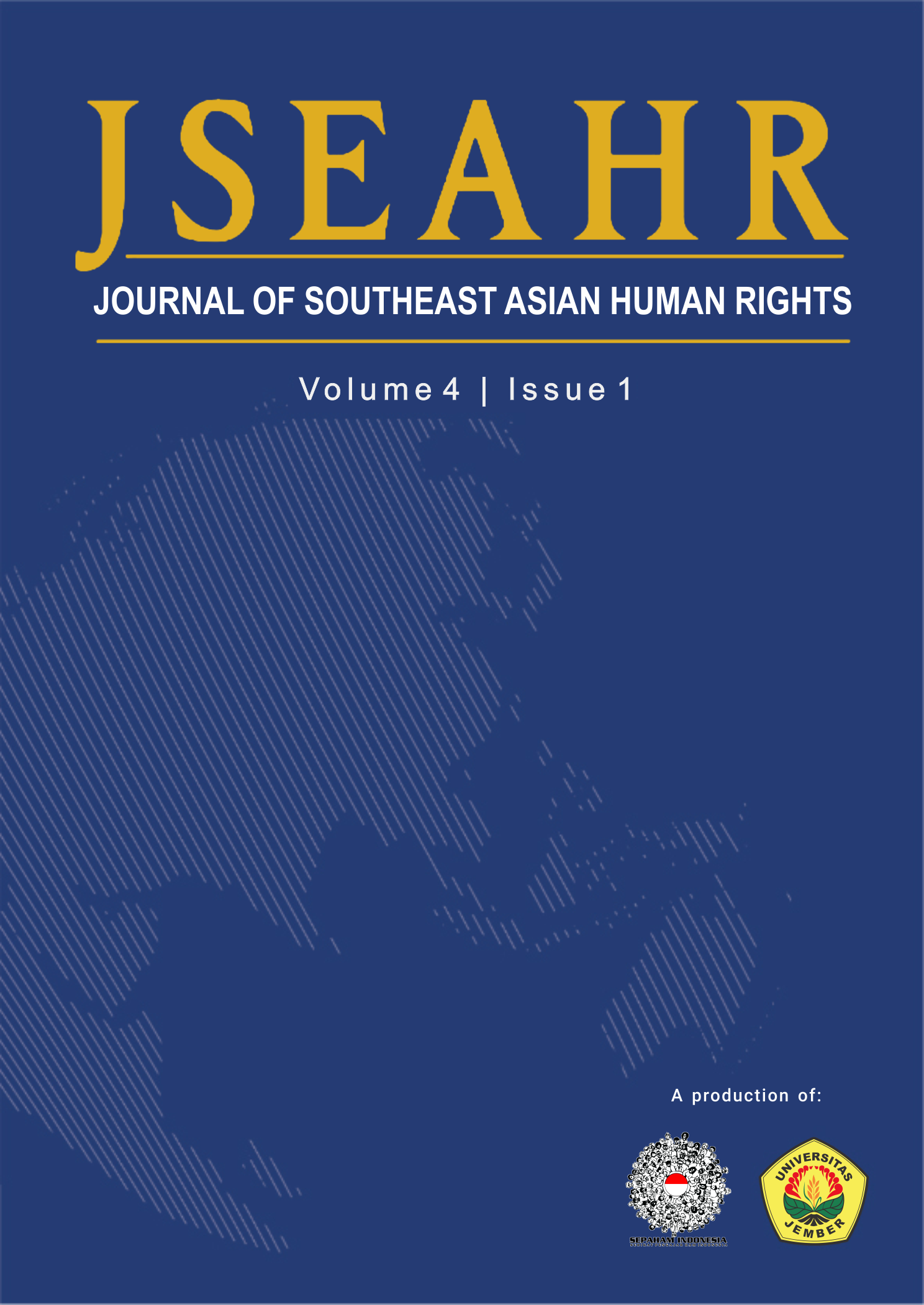The Paradox Between Universalism of Human Rights and Relativism of Culture
A Case Study of Honour Killings in India
DOI:
https://doi.org/10.19184/jseahr.v4i1.8597Keywords:
Honor Killing, India, Human Rights, UniversalismAbstract
The rising tide of Honour killings against Hindu women and their justified murder in the name of culture by their parents/relatives, superficially reflects the tension between traditional and modern values in India. At a deeper level, cases of Honour killings represent the ongoing struggle between the universality of human rights and cultural relativism. Against this background, this article critically examines the role of universal human rights in relation to cultural relativism whilst assessing the values that claim to support honour killings in Indian culture. This article will examine the universalism of human rights and their influence on gender-based violence- especially relating to honour killings in North India. In addition, I will argue for an approach (drawing on the seminal work of Donnelly who proposed ‘relative universalism of human rights’) allowing the tension between universality and particularity/relativism can be reconciled.
Downloads
References
Adami, R (2012), “Reconciling Universality and Particularity through a Cosmopolitan Outlook on Human Rights,†Cosmopolitan Civil Societies Journal, vol 4. No.2
An-Na’im, A (1992), “Introduction,†in Abdullahi Ahmed An-Na’im, ed., Human Rights in Cross-Cultural Perspectives: A Quest for Consensus, University of Pennsylvania Press, Philadelphia, pp. 1-15.
An-naim, A (1990), “Human Rights in the Muslim World: Socio-Political Condition and
Scriptural Imperatives,†In Patrick Hayden (Eds.) The Philosophy of Human Rights (pp. 315-335) St. Paul, Paragon House

Annavarapu, S. (2013) Human rights, honor killing and Indian law Scope for rights to have right, Economic and Political Weekly, vol. xl vIII no. 50

Baxi, Pratiksha, Shirin M Rai and Shaheen Sardar Ali (2006): “Legacies of Common Law: ‘Crimes of Honour’’ in India and Pakistanâ€, Third World Quarterly, 27: 7, 1239-53.
Chesler, P. and Bloom P, (2012) “Hindu vs Muslim Honour Killingsâ€, Middle East Quarterly, Summer 2012: 43-52.
Constitution of India, accesses on 23 Nov. 2014, available at http://lawmin.nic.in/coi/coiason29july08.pdf on 23 Nov. 2014
Dogan, R (2014) Different Cultural understandings of Honour that Inspire Killing: An inquiry into the Deferent’s perspective, Homicide Studies, 18:363, 2014
Donnelly, D (1984) Culture relativism and universal human rights, Human Rights Quarterly, vol. 6, no. 4, pp.400-119
Donnelly, D (2007) The relative universality of human rights, Human Rights Quarterly, vol.29, no-2, pp.281-306
Douzinas, C. (2007) The Many Faces of Humanitarianism, Parrhesia Journal, 2, pp.1â€28
Perrin, A (2005) Human Rights and Cultural Relativism, the “Historical Development†Argument and Building a Universal Consensus
Goodhart, M (2008) "Neither relative nor universal: A response to Donnelly", Human Rights Quarterly, vol.30, no. 1, pp.183-193
Hunt, L. (2007) The Soft Power of Humanity Why Human Rights Failed Only to Succeed in Long Run, In Inventing Human Rights A History, W.W. Norton and Company, New York
Ignatieff, M (2001) “Human rights as a politics and idolater†Princeton university press, New Jersey
Kachwaha, K (2011) "Khap Adjudication in India: Honoring the Culture with Crime", International Journal of Criminal Justice Science, vol. 6 june-july Dec. 2011
Kucuradi, I (2008) The question of "Universality versus Particularity?" In the light of epistemological knowledge of norms, available at http://archive.unu.edu/dialogue/papers/kucuradi-s5.pdf
Lee, M (2011), "Religion, human rights and the role of culture", The International journal of Human Rights, 15:6, 887-907
Li, X (1996) “Asian Values and the Universality of Human Rightsâ€, In Patrick Hayden (Eds.) The Philosophy of Human Rights (pp. 397-408) St. Paul, Paragon House
Martin, Jacques (2011) “Introduction’, in Human Rights: Comments and Interpretation (A Symposium edited by UNESCO, July 1948) London.
Mignolo, W. (2009), Who Speaks for the ‘Human’ in Human Rights? Human
Rights in Latin American and Iberian Cultures, 5(1),7-24.

Moyn, S. (2010) Epilogue in: The Burden of Morality, In the Last Utopia Human Rights in History, Harvard University Press, UK.
Mutua, M. (2001) “Savages, Victims, and Saviours: The Metaphor of Human Rights,†Harvard International Law Journal, vol. 42, pp. 201-245.
Nussbaum, M (2001) “The Central capabilities in Creating Capabilities", Cambridge.
On, S (2005) "The Relative Universality of Human Rights: An Assessment", Perspective on Global Development and Technology, vol. 4, issue 3-4,
Quataert, H. (2009) Advocating Dignity: Human Rights Mobilizations in Global Politics. Philadelphia: University of Pennsylvania Press, pp. 1–13.
Santos, S. (2009), ̳If God Were a Human Rights Activist: Human Rights and the Challenge of Political Theologies Is Humanity Enough? The Secular Theology of Human Rights ‘, (1) Law, Social Justice & Global Development Journal (LGD). <http://www.go.warwick.ac.uk/elj/lgd/2009_1/santos>
Vishwanath, J. and Palakonda S (2011): “Patriarchal Ideology of Honor andHonor Crimes in Indiaâ€, International Journal of Criminal Justice Sciences, vol. 6, Issue 1- 2: 386-95.
Yadav and Bhupendra (2009): “Khap Panchayats: Stealing Freedom?â€, Economic & Political Weekly, Vol XLIV, No 52: 16-19, 26 December.
Waltz, S (2004) “Universal Human Rights: The Contribution of Muslim States,†Human Rights Quarterly, vol. 26, pp. 799-844.
Yasuaki, O (2000) "In quest of Intercivizational Human Rights- Universal Vs. Relative, Human Rights Viewed from an Asian Perspective", Asia Pacific Journal on Human Rights and the Law, 1 35-88.
Zechenter, E (1997) “In the name of Culture: Culture relativism and the abuse of the individual†Journal of Anthropological Research, vol. 53, pp.319-347







